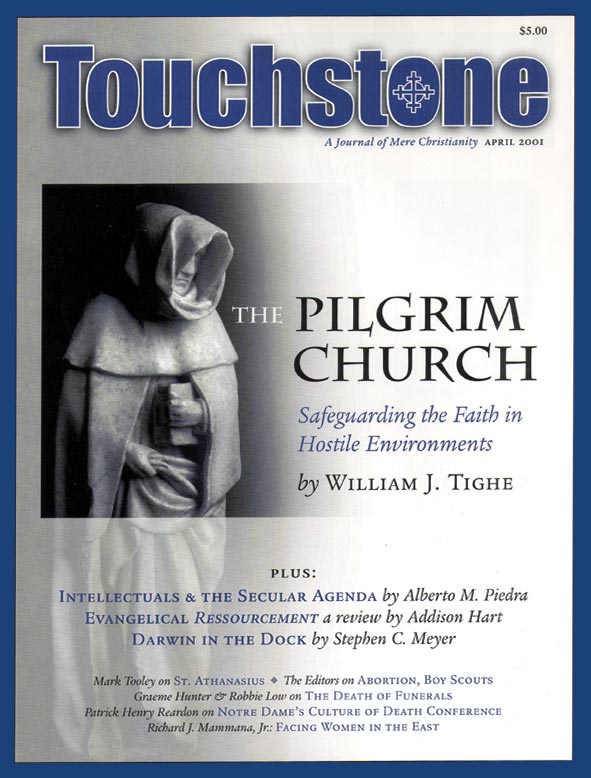Weapons of the Left & the Right
Confronting the Secular Mentality in the Post-Soviet Era
by Alberto M. Piedra
Historical changes do not just happen. They are brought about by the decisions of men and women who have developed and put their ideas into practice. History is replete with cases in which powerful ideas have influenced and, to a certain extent, determined the cultural framework of various societies.1 For example, the influence of Christianity on Europe’s brilliant cultural heritage is recognized by Christians and non-Christians alike. European culture cannot be understood without reference to Christianity, for it is the very soul of Europe.2
The cultural transformations that have taken place in society over the centuries are mainly the result of the ideas of men and women who, with a definite goal in mind, have been instrumental in creating new patterns of human behavior. Nothing gives greater credibility to a political or moral value than an idea or belief that is considered essential for the improvement of mankind.3 The close functional relationship between the promotion of a given set of ideas and human behavior is too evident to be denied.
Human behavior does not function in a vacuum. Most often, it is related to a specific concept of man, that is to say, to an idea about who man is or should be. These ideas concerning man and his goals on earth, in their turn, foster changes in codes of behavior that are mainly responsible for those cultural revolutions that affect society. As was noted by Rafael Gomez Perez, professor of philosophy in Madrid, a cultural revolution, in the least ideological sense possible, begins when the tradition received is altered or modified in its central ideas, the ideas by which man is governed—e.g., the meaning of life, the concept of the family, the transmission of life, the concrete significance of happiness, and the goals and forms of education.4 These changes are always propagated by professionals in the field of ideas, i.e., intellectuals in the broad sense of the term.
The British historian Paul Johnson reminds us in his book Intellectuals that with the decline of clerical power in the eighteenth century a new kind of mentor emerged, the secular intellectual, who might be deist, skeptic, or atheist, but who “was just as ready as any pontiff or presbyter to tell mankind how to conduct his affairs.”5 The liberal ideas of the secular intellectuals came to fruition with the Enlightenment and have permeated political and economic thinking ever since.
We shall limit ourselves here to a brief analysis of the secular intellectuals and how the diffusion of their ideas, inherited from the Enlightenment, have fostered the cultural revolution that is gradually undermining the basic values of our Judeo-Christian civilization.
Enlightenment Twins
With the collapse of the Soviet Union and the discredit into which Marxist-Leninist ideas and policies have fallen, it might seem as though Christianity and the basic notions of freedom and the dignity of the human person are no longer in danger. It is true that most of the ideological variations of Marxism and its philosophical roots have been disqualified, having been demonstrated not only to be economically inefficient but also to constitute a threat to freedom and the basic rights of the human person.6
But it is likewise true that there are other ideological currents of thought that, though rejecting Marxism-Leninism, are also resistant to religion and the concept of a providential God.7 Among these, perhaps the most dangerous are the ones that have their roots in what can be called a deviation from historical liberalism but that, because of their subtlety, represent an even greater threat to the fundamental principles of Christianity.8
The secular mentality was a European phenomenon later exported to America. Its roots, as is well known, can be traced to the era of the Enlightenment. Although the Enlightenment was deist in origin, many of its representatives and followers later became outright atheists. Economic liberalism, with its materialistic and hedonistic approach to the science of economics, is not exempt from this same trend toward atheism. The same can be said to an even greater extent, and more blatantly, of the Marxist and neo-Marxist interpretation of history.
subscription options
Order
Print/Online Subscription

Get six issues (one year) of Touchstone PLUS full online access including pdf downloads for only $39.95. That's only $3.34 per month!
Order
Online Only
Subscription

Get a one-year full-access subscription to the Touchstone online archives for only $19.95. That's only $1.66 per month!
bulk subscriptions
Order Touchstone subscriptions in bulk and save $10 per sub! Each subscription includes 6 issues of Touchstone plus full online access to touchstonemag.com—including archives, videos, and pdf downloads of recent issues for only $29.95 each! Great for churches or study groups.
Transactions will be processed on a secure server.
more from the online archives

14.1—January/February 2001
The Christian Heart of Fatherhood
The Place of Marriage, Authority & Service in the Recovery of Fatherhood by John M. Haas
calling all readers
Please Donate
"There are magazines worth reading but few worth saving . . . Touchstone is just such a magazine."
—Alice von Hildebrand
"Here we do not concede one square millimeter of territory to falsehood, folly, contemporary sentimentality, or fashion. We speak the truth, and let God be our judge. . . . Touchstone is the one committedly Christian conservative journal."
—Anthony Esolen, Touchstone senior editor








